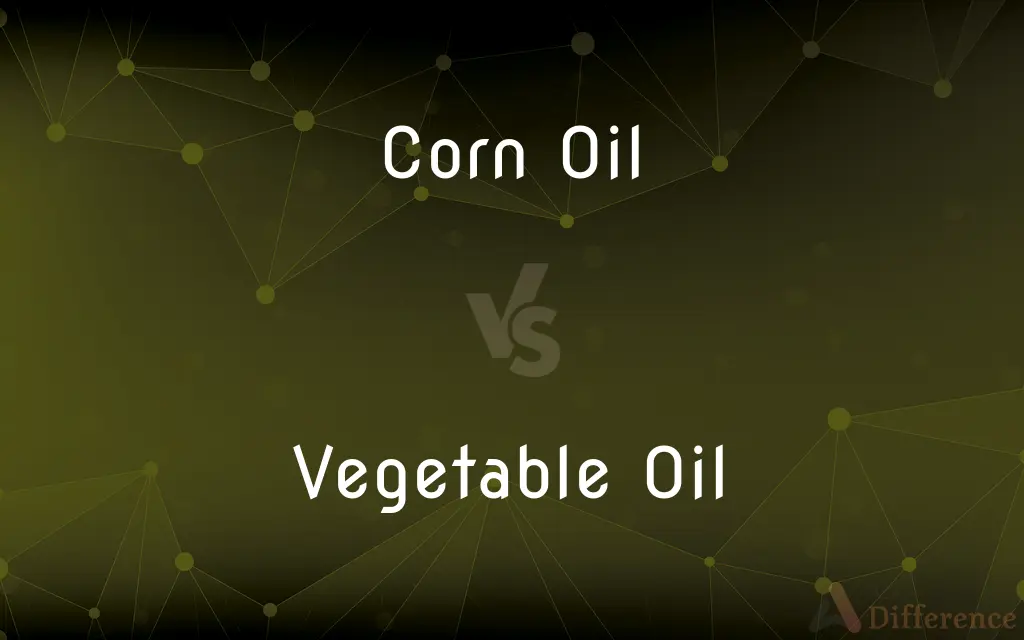Corn Oil vs. Vegetable Oil — What's the Difference?
By Tayyaba Rehman — Published on January 11, 2024
Corn oil is extracted from corn kernels and is high in polyunsaturated fats, while vegetable oil is a blend of various plant-based oils and has a varied nutritional profile.

Difference Between Corn Oil and Vegetable Oil
Table of Contents
ADVERTISEMENT
Key Differences
Corn oil is a specific type of vegetable oil derived exclusively from the germ of corn kernels. It is known for its high content of polyunsaturated fatty acids, particularly linoleic acid. Vegetable oil, on the other hand, is a more general term that refers to a blend of different plant-based oils, which can include corn oil but often contains oils like soybean, canola, and sunflower.
In terms of usage, corn oil is often praised for its mild flavor and high smoke point, making it suitable for frying and baking. Vegetable oil, due to its varied composition, is also versatile in cooking but may have different smoke points and flavors depending on the specific blend of oils it contains.
Nutritionally, corn oil is rich in vitamin E and omega-6 fatty acids, which are essential for health but should be balanced with omega-3 fatty acids. Vegetable oils can vary widely in their nutritional content, with some blends being higher in monounsaturated fats or omega-3 fatty acids, depending on the oils used.
Corn oil has a distinct golden color and is also used in margarine and salad dressings due to its emulsifying properties. Vegetable oil, given its varying composition, can range in color from light to deep yellow and is a staple in many kitchens due to its all-purpose cooking utility.
In terms of health impact, corn oil's high polyunsaturated fat content can be beneficial for heart health when used in moderation. However, the nutritional value of vegetable oil can vary; some blends may be healthier than others, depending on the balance of saturated, monounsaturated, and polyunsaturated fats.
ADVERTISEMENT
Comparison Chart
Source
Extracted from corn kernels
Blend of various plant-based oils
Nutritional Content
High in polyunsaturated fats, vitamin E
Varied, depends on blend of oils
Cooking Use
High smoke point, mild flavor, good for frying
Versatile, varies in smoke point and flavor
Common Composition
Primarily linoleic acid
Can include soybean, canola, sunflower oils, etc.
Health Benefits
Good for heart health in moderation
Varies, can be balanced or high in certain fats
Compare with Definitions
Corn Oil
Derived from corn
Corn oil is extracted from the germ of corn kernels.
Vegetable Oil
Cooking versatility
I use vegetable oil for both frying and baking.
Corn Oil
Mild flavor
Corn oil's mild flavor doesn't overpower the taste of dishes.
Vegetable Oil
Common kitchen staple
Vegetable oil is a staple in many cooking applications.
Corn Oil
High in linoleic acid
Corn oil contains a high amount of polyunsaturated fats.
Vegetable Oil
Varied health impact
The health benefits of vegetable oil depend on the types of fats present.
Corn Oil
Cooking oil
I use corn oil for frying due to its high smoke point.
Vegetable Oil
Nutritional variety
The nutritional content of vegetable oil varies based on its composition.
Corn Oil
Heart health
Corn oil can be heart-healthy when used in moderation.
Vegetable Oil
Plant-based blend
Vegetable oil in my kitchen is a blend of soybean and canola oils.
Common Curiosities
Does corn oil have a strong flavor?
No, it's known for its mild flavor.
Is corn oil healthier than vegetable oil?
It depends on the specific nutritional needs and the composition of the vegetable oil.
Can corn oil be used in salad dressings?
Yes, its mild flavor makes it suitable for dressings.
Can I use vegetable oil for deep frying?
Yes, but check the smoke point if it's a blend.
Is corn oil vegan?
Yes, it's plant-based and vegan.
Can I use vegetable oil instead of corn oil for frying?
Yes, most vegetable oils are suitable for frying.
Is vegetable oil good for baking?
Yes, it's commonly used in various baking recipes.
Is vegetable oil cholesterol-free?
Yes, like all plant-based oils, it doesn't contain cholesterol.
Is vegetable oil always a mix of different oils?
Generally, yes, though some may be predominantly one type of oil.
Does vegetable oil contain trans fats?
Most vegetable oils are free of trans fats unless hydrogenated.
Does corn oil contain omega-3 fatty acids?
It's higher in omega-6 fatty acids than omega-3s.
Can corn oil go bad?
Yes, it can become rancid over time.
Should I store corn oil in the fridge?
It's not necessary, but cool, dark storage extends its shelf life.
Can vegetable oil be used in a marinade?
Yes, it's a common ingredient in marinades.
Are there allergens in corn oil?
Pure corn oil is generally allergen-free, but those with corn allergies should consult a doctor.
Share Your Discovery

Previous Comparison
WPA vs. WPA2
Next Comparison
ADSL vs. VDSLAuthor Spotlight
Written by
Tayyaba RehmanTayyaba Rehman is a distinguished writer, currently serving as a primary contributor to askdifference.com. As a researcher in semantics and etymology, Tayyaba's passion for the complexity of languages and their distinctions has found a perfect home on the platform. Tayyaba delves into the intricacies of language, distinguishing between commonly confused words and phrases, thereby providing clarity for readers worldwide.











































